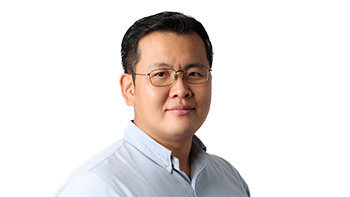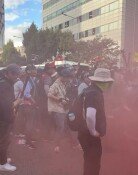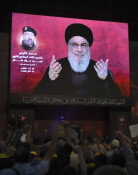Ruling party accelerates the president's lame-duck period
Ruling party accelerates the president's lame-duck period
Posted June. 14, 2024 07:39,
Updated June. 14, 2024 07:39

"If the Democratic Party of Korea (DPK) monopolizes the chairs of the 18 standing committees, it will surely backfire," the People Power Party (PPP) leadership said earlier this month, as negotiations with the Democratic Party for the formation of congressional leadership began in earnest. They repeated, "The majority opposition party’s unilateral actions will be brought to judgment," like a magical spell. The rationale was that in the 22nd general elections, the ruling party and the Democratic Party won 108 and 171 seats, respectively, a difference of 63 seats, but the national vote gap was only 5.4 percentage points. Asked if there was a solution that could stop it, they said, "There is none." On Monday night, the DPK unilaterally selected the chairs of 11 standing committees, including the Legislation and Judiciary Committee, Steering Committee, and Science, ICT, Broadcasting, and Communications Committee. The plenary chamber looked like a Democratic Party caucus.
The ruling party is still chanting, “The majority opposition party’s unilateral actions will be brought to judgment." "Parliamentary dictatorship, it's like being drugged with unilateralism,” the ruling People Power Party's (PPP) floor leader Choo Kyung-ho said. “The Democratic Party has lost its mind," he criticized. However, there are no signs of a backlash against the majority Democratic Party (DP). Four years ago, when the Democratic Party dominated 18 standing committees in the 21st National Assembly, the PPP was the opposition party, which is different from the current situation where the ruling party is giving it all away. There is a growing concern within the PPP that the backlash could target an irresponsible ruling party that only engages in boycotts.
The symbol of the lethargic ruling party is its first-term lawmakers, who have yet to enter the plenary chamber more than a month after its opening or serve on a standing committee. On June 5, when the Democratic Party and other opposition parties unilaterally elected Woo Won-shik as the speaker of the National Assembly, ruling party lawmakers held a protest rally in Rotunda Hall in front of the plenary chamber. The first-term Democratic Party lawmakers who entered the plenary chamber that day took a commemorative photo. Rotunda Hall comes from the word ‘rotunda,’ which refers to a round hall, but political circles joke that it means ‘let's process laws tenderly.’ This doesn't mean that the ruling party outside the chamber should just let the opposition parties tinker with bills. There is nothing that the ruling party’s special committees without legislative power can do. "It's like we've become the ruling 'opposition party,'" said one first-term lawmaker from the ruling party.
Although the ruling party believes the presidential veto backs it up, President Yoon Suk Yeol's approval ratings are in jeopardy. According to the latest Korea Gallup poll, Yoon's job performance approval rating was 21 percent, the lowest since he took office. His disapproval rating was 70 percent, the highest since he took office. In this situation, the sentiment of the Korean people would not side with a possibly repeated ruling party's veto request and President Yoon's vetoes.
End-of-term lame ducks are inevitable in a nation with a one-term presidency. But now, in the middle of his third year in power, it's time to get work done. If the president's approval ratings continue to decline, his command won’t be convincing, and the public sector will not move. "The rest of the presidential term could be the lost three years," warned one political scientist, and it doesn’t ring hollow. We've come to the point where the lethargy of the ruling party is holding us back.
Hoon-Sang Park tigermask@donga.com







